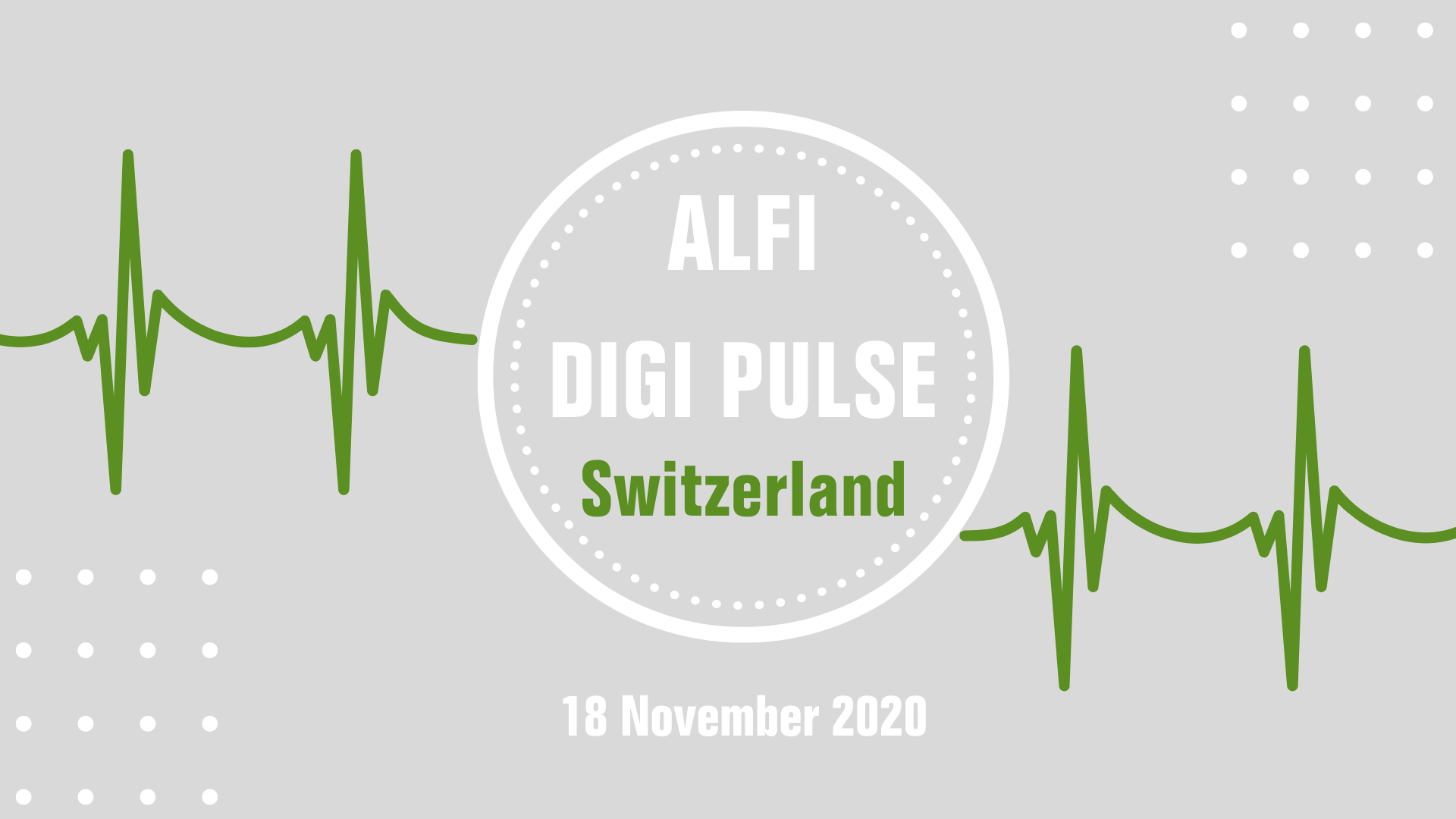From sustainability to cross-border pensions and data governance, last week’s Digi Pulse Switzerland virtual event covered key issues for the asset management industry. Here’s a recap we put together as media partners for ALFI‘s event. Take a look at their site to see if you’d be interested in any of their upcoming virtual conferences.

Swiss asset managers see new opportunities in Luxembourg fund toolbox
Amid an environment of economic, financial, political and medical uncertainty unprecedented in the modern era, Swiss asset managers targeting European or global investors continue to rely on Luxembourg as an investment fund hub attuned to their needs and constantly evolving to meet the requirements of the international marketplace, according to speakers at the ALFI Digi Pulse Switzerland on November 18.
Event chairman Daniel Siepmann, CEO of Credit Suisse Fund Services (Luxembourg), told participants in the annual industry gathering from two of Europe’s (and the world’s) most important international financial centres – transformed from a face-to-face roadshow to an online meeting reflecting the constraints of the Covid-19 pandemic – that Swiss asset managers already account for 14% of Luxembourg’s fund assets, a total of € 630 bn in 2,745 funds run by 157 managers.
Siepman says the grand duchy’s appeal to the Swiss investment industry lies in its wide product palette, including both unregulated and highly regulated vehicles. They encompass recent additions such as reserved alternative investment funds (RAIFs), which offer managers exceptional flexibility and rapid time to market, as well as special limited partnerships, designed to offer the same legal characteristics as US and UK partnership structures, and of which more than 4,000 have been established since 2017.
Future ambitions
Members of ALFI’s strategic advisory board say the organisation has no intention of resting on its laurels and is pressing ahead with ambitious goals for the next five years. Steven Libby, EMEA asset and wealth management leader at PwC Luxembourg, says the need for longterm European cross-border savings and pensions solutions has been underlined by the pandemic. The time may finally have come for the Pan-European Personal Pension, a voluntary complementary pension product offering an alternative to national retirement savings schemes.
LuxFLAG chairwoman Denise Voss says the Build Back Better concept for recovery from the pandemic offers an enhanced opportunity for Europe’s asset management industry to demonstrate its value not only by expanding the scope of sustainable products but boosting education on sustainable finance and investing for members of the sector as well as the public. “The next generation will expect ESG products to be the default,” she said, “and so will future potential recruits to the asset management industry.”
Capital Group’s Jean-Marc Goy says UCITS have been recognised globally as a label of strong investor protection for more than three decades, becoming one of the biggest success stories of the EU single market for financial services. Meanwhile, the Alternative Investment Fund Managers Directive has paved the way for Luxembourg to become a global private equity hub, noted EY’s private equity fund leader for EMEA and India, Alain Kinsch, “thanks to its constantly enhanced toolbox, and as a cost-effective place to do business thanks to a deep ecosystem, talent and best practice across the value chain”.
Asset managers and stewardship
The European Securities and Markets Authority is pushing for the convergence of rules governing UCITS and alternative investment funds, a process that is already underway, says Ilias Georgopoulos, CEO of Credit Suisse’s MultiConcept Fund Management. However, he cautions against ESMA’s call for tighter rules on cross-border delegation of asset management functions – ostensibly because of Brexit, but a shift that would also affect groups in Switzerland and the United States. “Luxembourg has 30 years of delegation experience,” Georgopoulos said. “Don’t change things that work.”
GAM’s head of continental Europe Martin Jufer highlights the broader role of asset managers in society. “The growth of responsible investment reflects investor demand and represents an opportunity for asset managers to embrace a stewardship role on their behalf,” he said. “But it requires a huge commitment starting with boards, people and processes to make sustainability an integral part of strategy, including governance issues such as engagement with companies and proxy voting.”
Head of products Michael Kehl says UBS Asset Management is moving ESG integration into everything it does and all its products: “It is embedded in almost every active investment decision.” Arguing that the challenge of the EU’s Sustainable Finance Action Plan is to find the right balance between establishing common standards and encouraging innovation, Kehl says Switzerland is likely to follow the EU blueprint closely, especially given the growing political strength of the country’s Green Party.
Regulation and compliance
Luxembourg’s financial regulator is playing an important role, says Arendt & Medernach partner Henning Schwabe. He said: “The CSSF is helping the industry prepare for application of the EU’s Sustainable Finance Disclosure Regulation on March 10 next year, putting in place a fast-track procedure to get prospectuses updated in time.” He also cites the regulator’s measures to ease strain on asset managers during the pandemic, including use of swing pricing, authorisation of digital signatures and flexible over reporting deadlines.
The CSSF is also stepping up its requirements for effective anti-money laundering controls, notes Elvinger Hoss Prussen partner Gast Juncker. “Following money laundering scandals, it is demanding that AML risks are addressed not only at distribution level but in terms of assets, counterparties and delegates, and non-compliance will be met with stronger enforcement,” he said.
The intertwining of sustainable investment and post-pandemic economic recovery should give further impetus to Luxembourg’s role as a centre for private equity and infrastructure investment, says EY senior audit manager Stefan Rech. “Renewable energy is a key focus, with compound growth of installed capacity averaging 8.5% annually since 2010,” he said. As coal consumption declines and transmission and storage technology improves, renewables’ share of global power generation is forecast to increase from 15% to 25% over the next 10 to 15 years.
Transparency, governance and data
Partners Group’s head of infrastructure business development Robert-Jan Bakker says that together with electricity generation, transport and the built environment offer pathways to tackle 75% of carbon emissions. “For the remaining 25%, we are looking at carbon capture and storage, particular in the US, which has clusters of big emitters, regulatory pressure and natural underground storage capacity,” he said.
Northern Trust EMEA product manager Stuart Lawson argues that recent experience has demonstrated the critical importance of ensuring investors understand the liquidity characteristics of such investments. “The challenge is to ensure that the structure of a fund is aligned with investor expectations and the nature of the assets,” he said. “For instance, renewable energy offers steady and progressively increasing income, but it is very illiquid.”
This comes back to transparency, but also governance, Lawson says – and the critical importance of data. He said: “People active in governance need to be qualified, and based in the location where the fund is regulated; decisions need to be properly documented, and checks and balances incorporated into the investment process. Operating models must be redesigned and re-engineered around data and data strategy; reporting must be reliable, comparable across the industry and consistent with its standards.”
As the global economy gradually emerges from the slump precipitated by Covid-19, ALFI Digi Pulse Switzerland participants agree that the symbiosis of the country’s asset management industry with Luxembourg’s fund structuring, servicing and distribution capabilities will be more important than ever.
Interested in sustainability, finance, and the funds sector? We think you’ll like:
- Interview With LuxFLAG Chairwoman Denise Voss
- Private Equity In The Covid-19 World: Hero Or Villain?
- From The 2008 Financial Crisis To Coronavirus Recession: Are The Banks Safe This Time?

